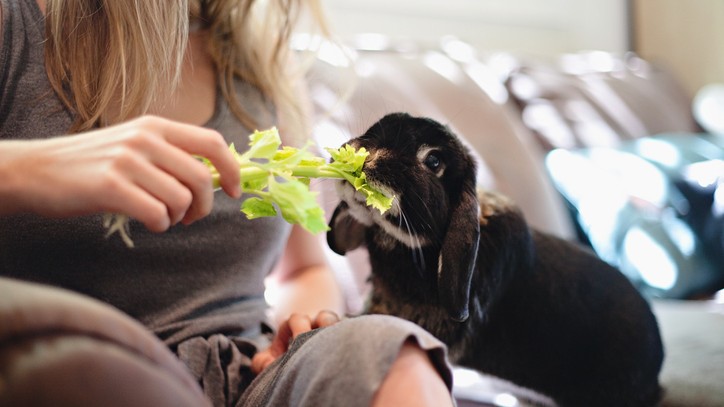Can rabbits eat celery? – Dietary advice for your rabbit
Rabbits can eat a variety of fresh foods, but can rabbits eat celery? Read on to find out if celery is a suitable food for your pet

Get the best advice, tips and top tech for your beloved Pets
You are now subscribed
Your newsletter sign-up was successful
When asking “can rabbits eat celery?”, it is important to understand what celery is. Celery, or to give it its scientific name, Apium graveolens, is a marshland plant which belongs to the family Apiaceae, and is a popular food item for human consumption. Celery has several long fibrous stalks, tapering into leaves, with the stalks coming together at the stem, forming a bunch. As such, celery is one food that can be eaten by both humans and rabbits, although the best food for the latter is grass and hay. That said, celery can be used as a tasty treat that your pet will doubtless enjoy.
Is celery good for rabbits?
All parts of celery can be fed to rabbits, including the leaves, and it contains many vitamins and minerals. These include vitamin A, B-complex vitamins, vitamin C, vitamin E, folate, sodium, copper, magnesium, iron, zinc, and potassium, to name a few!
Like all things, everything should be fed in moderation and when introducing a new food, it is vital to do so slowly over the course of 10-14 days, to allow the rabbit’s digestive system time to adapt. Sudden changes to a rabbit’s diet can cause serious and potentially fatal diarrhoea.
When introducing celery for the first time, start with a piece the size of your fingernail and over the next 10-14 days increase this to a maximum of half a stalk, which can be cut into inch-long pieces.
Celery can be fed 2-3 times per week, alongside other suitable vegetables.
Can celery be bad for rabbits?
Not all rabbits like celery and not all can tolerate it. Most digestive upsets occur when a new food is introduced for the first time, so if there is any digestive upset during the introduction, such as uneaten caecotroph droppings, wetter than usual faecal pellets, diarrhoea, or a reduction in appetite, stop feeding celery, remove it from the diet completely and speak to your vet.
If rabbits are fed something they enjoy and find tasty, they may not consume enough hay and grass, which is a vital element of their diet, so it must be fed in moderation to prevent this from happening.
Get the best advice, tips and top tech for your beloved Pets
Tips on feeding celery to your rabbits
You can integrate feeding celery and other foods into games for your rabbit to make meal times more fulfilling – scatter-feed fresh foods and pellets or hide them in piles of hay for the rabbits to find, which is a much more natural feeding pattern for rabbits.
The bulk of a rabbit’s diet must consist of grass and/or hay, which should make up a minimum of 85% of their food intake. This has more than one benefit and is essential to help keep their ever-growing teeth worn down, but also to ensure their digestive system functions correctly. The next part of their diet, making up 10%, should be fresh greens and herbs, which can include celery. The other 5% of their diet should be the best rabbit pellets, to help ensure they receive all the vital vitamins and nutrients which hay, grass, greens and herbs may not provide. Failure to provide a correct diet can lead to numerous, potentially serious health problems, such as dental disease, digestive problems and weight gain. These, in turn, can cause secondary health conditions, such as sore hocks, flystrike, and urinary tract disease, shortening the rabbit’s lifespan.
Conclusion
Celery stalks and leaves are safe to feed rabbits and tolerated by most, although may be disliked by some. It should not form a large portion of the diet and must be introduced slowly to minimise the risk of digestive upsets.
Claire currently works in Kettering as a Head Nurse in a practice with a high rabbit caseload, as well as frequently lecturing and writing on rabbits to both veterinary professionals and owners.

